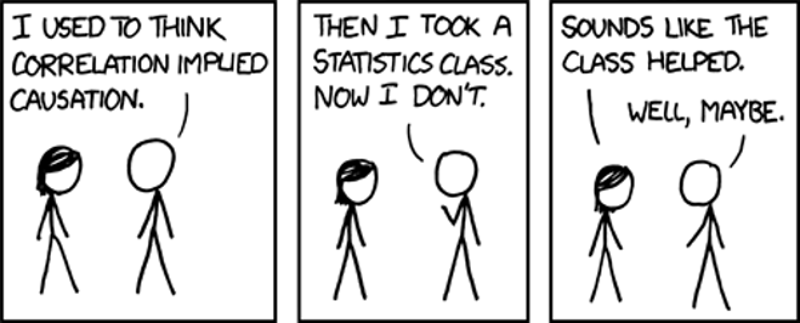FACT: 89% of the statistics you read online or in the media are misinterpreted or misrepresented.
A petition to ban plastic water bottles from the Leeds University Union Co-op gained traction in early March, securing over 1500 signatures in 48 hours. As with any controversial issue, an assortment of vicious social media skirmishes were started and fought to their bloody finish beneath Facebook’s blue banners; comments, replies and reactions whistling ominously overhead. These battles are usually futile – nobody’s ever changed their mind because of a Facebook comment.
Then a point was made that caught the eye: ‘while we’re on the subject, fishing is responsible for 50% of the world’s plastic pollution’. A statistic! A somewhat irrelevant one to the point at hand, but attempt to support an argument with actual data. And staggering data at that. So staggering indeed, it beggared belief. It certainly merited a Google.
The search revealed this statistic is, essentially, as garbage as the floating masses of rubbish to which it refers. Despite appearing on a multitude of vegan sites, the main source of this ‘fact’ is a (published and peer reviewed) Great Ocean Cleanup (GOC) study which found ~46% of the trash in the Great Pacific Garbage Patch – the largest floating mass of rubbish in our oceans – to be fishing gear. However, at a total 80,000 tonnes the GPGP is not representative of the entire ocean (the study estimates we pump between 6 and 13 million tonnes of plastic into our oceans each year) and the same study goes on to estimate ‘fishing, aquaculture and shipping to be responsible for 28.1% of global plastic inputs into the ocean’. Still an astonishing figure, a disturbing one, and one that demands action. But it’s 28% (not 50); it’s fishing, shipping, and aquaculture (not exclusively fishing); and it’s the oceans (not the entire world). The data from the study had been mangled and reformed to drive home the appropriate (in this case, vegan) agenda.
It might seem incredibly pedantic to pick out the detail in a single social media comment but it’s symptomatic of a wider problem. Well researched and rigorous academic studies and convincing figures are consistently reduced to drivel in order to make a point. And to be clear, this isn’t the users’ fault – people read the headline figure, see it’s supported by a study or numerical data, and (appropriately) are convinced. See: $350 million a week for our NHS.
The responsibility lies with influencers and the media, who should be delivering the data in a way that accurately reflects its significance instead of converting it to clickbait and/or politically motivated garbage. Without proper interpretation, energy and action will always be misdirected, and the road to solving these critical issues simply becomes more convoluted.
This is particularly evident in another example that recently resurfaced in a widely-circulated post, the ‘it gets worse’ speech from influencer Marc Doll. Very emotive and convincing stuff, and featuring a rephrasing of the eternally popular ‘Just 100 companies are responsible for 71% of global emissions’ stat. An old friend for smacking the nasty big business companies over the head and for salving any of our own guilt about excessive consumption. It’s a statistic that fundamentally suggests the key to battling greenhouse gas emissions and climate change lies in holding these companies accountable. But this isn’t the case.
First, this report considers ‘industrial emissions’, and so omits the contributions of land use, forestry, and agriculture – all well established and significant contributors. Second, the report assigns to these companies what it refers to as ‘Scope 3’ emissions, which represent those released by the end user when they combust fossil fuels for energy: i.e. coal in a power plant or petrol in a tank. These ‘Scope 3’ emissions make up 90% of those considered in the report. This is why all 100 companies in the report are fossil fuel extractors/producers/sellers. These companies should be working to develop alternative fuel sources, yes, but the data shows onus lies with us on the demand side too. In any event, climate change hasn’t arisen solely from a bunch of heavily moustached and top-hatted big business barons cackling evilly in front of a furnace as the misappropriated statistic suggests.
So how do we go about tackling the issue? It’s certainly disconcerting to think that in the age of click-bait the headline figures from the Guardian, Telegraph etc. are often about as reliably reported as the ‘study shows gin drinkers are sexier’ guff you get from Buzzfeed. We need better and less politicised interpretations of the data, and there are some great sources: Full Fact are an independent fact-checking charity, and podcasts like the BBC’s More or Less help build an appropriate level of statistical cynicism. Really, the only way to be sure what the study is saying is to have a read yourself – the introduction is often enough for you to get the proper gist of its outcomes.
Though not every academic study is reliable (think the original anti-vaxers), we should at least be able to trust our influencers and media to report their findings accurately. But real data just doesn’t make great news, and isn’t as exciting as the fanaticised figures we end up receiving, so it’s not the case. As long as it persists, we’ll continue to misdirect the public’s energy and action.

